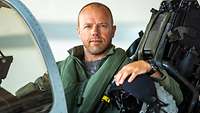The role of Air Force weapons instructors during Air Defender 2023
The role of Air Force weapons instructors during Air Defender 2023
- Date:
- Place:
- Germany
- Reading time:
- 3 MIN
With Air Defender 2023 (AD23), Germany has proven that it can assume responsibility within the NATONorth Atlantic Treaty Organization Alliance: 25 nations, over 10,000 participants, 9 training days, 250 aircraft, 26 aerodromes used in Europe, 1,808 sorties. Lieutenant Colonel Dirk Pingel, Commandant of the Air Force Weapons School, explains the role of the Air Force weapons instructors in this large-scale exercise.
Planning for Air Defender 2023 began in 2018. The long planning period alone already indicates the complexity of the exercise. What role did the Air Force weapons instructors play in this?
First and foremost, weapons instructors are trained to lead highly complex missions in the early days of a conflict. At our weapons school, we train them thoroughly. This enables them to analytically assess the tactical potential of the enemy, the weapon systems assigned to them and the personnel that operate them; they then plan, lead and follow up joint air operations at the outset of a conflict. In the process, they strictly adhere to NATONorth Atlantic Treaty Organization rules. The next level is to develop such missions as realistically as possible as part of an exercise.
Ultimately, it was the training in the weapons instructor course, the experience gained afterwards in the operational unit and the intensive exchange with us – we regularly plan exercises in various forms for the Air Force – that gave the AD23 weapons instructors the know-how to make a success of this important exercise.
Which tasks were assigned to the Air Force weapons instructors during Air Defender 2023?
The weapons instructors from the flying branch and military intelligence designed the missions for the exercise control center at the central situation and operations center. There, they led and monitored the planning, briefings and debriefings for the participating units via video teleconferences.
During the missions, the weapons instructors at the central situation and operations center also introduced situational changes into the ongoing missions. This meant that all exercise participants had to react to changing situations and request corresponding status reports from the control and reporting centers (CRCs).
At the CRCs, weapons instructors of the tactical air command and control service briefed and instructed the controller combat crews while the weapons instructors of the flying units prepared their crews for the Air Defender 2023 exercise and assumed the role of mission commander or package commander together with experienced flight commanders.
Did weapons instructors also play an important role on the international level? Was there an international exchange among weapons instructors?
In particular, the flying crews of the USA, the Netherlands, Belgium and Great Britain had their formations led and their new flight commanders trained by weapons instructors.
Does Air Defender 2023 have an impact on the planning or the content of future training courses at the Air Force Weapons School? If so, to what extent?
The approach to training pursued by the Air Force Weapons School was confirmed by the lessons learned during AD23 and will therefore only undergo minor adjustments. It became particularly clear that weapons instructors are needed in other areas as well, for example for joint fire support, surface-to-air missile units and unmanned aerial vehicles or helicopters.
The Air Force Weapons School will expand training in these areas from 2025. In addition, the exercise emphasized the importance of a comprehensive training airspace, which, in this case, actually could be implemented without major restrictions on civil air traffic. The Air Force Weapons School will partially adopt this concept in order to further improve training.
What relevance do Air Force weapons instructors have for the future of the Air Force?
The Air Force’s weapons instructors are strategic and operational pioneers and innovators who enable our Air Force to continually develop its capabilities from a tactical perspective and effectively address threats in various scenarios.
They ensure high quality, serve as role models and create trust among young soldiers during crises. They also offer competent advice to military and political leaders. At the international level, the Air Force thus ensures that it remains on a par with other nations that also employ weapons instructors.



